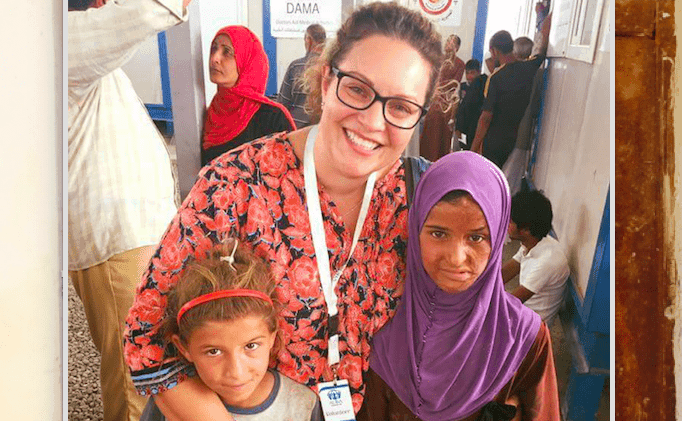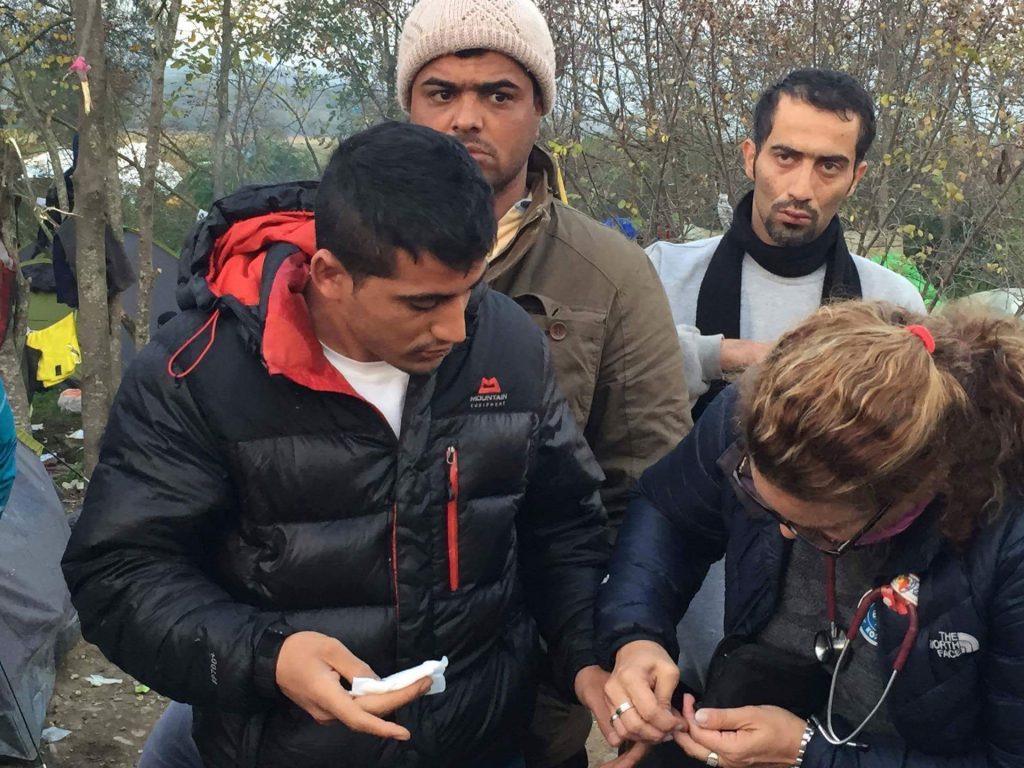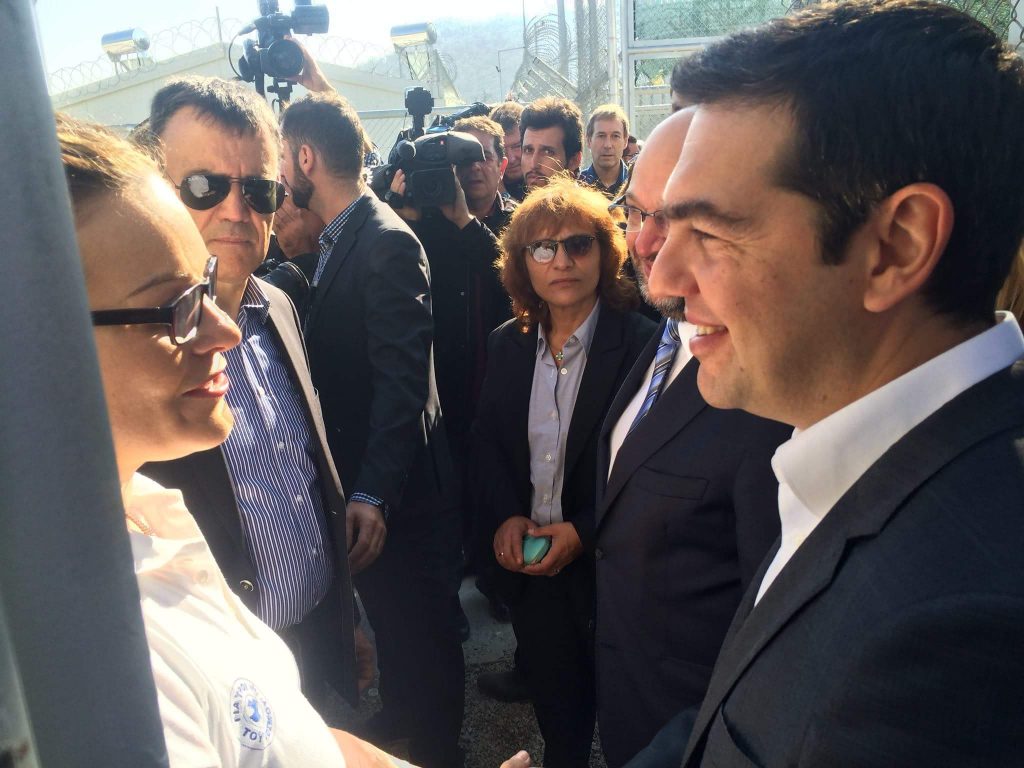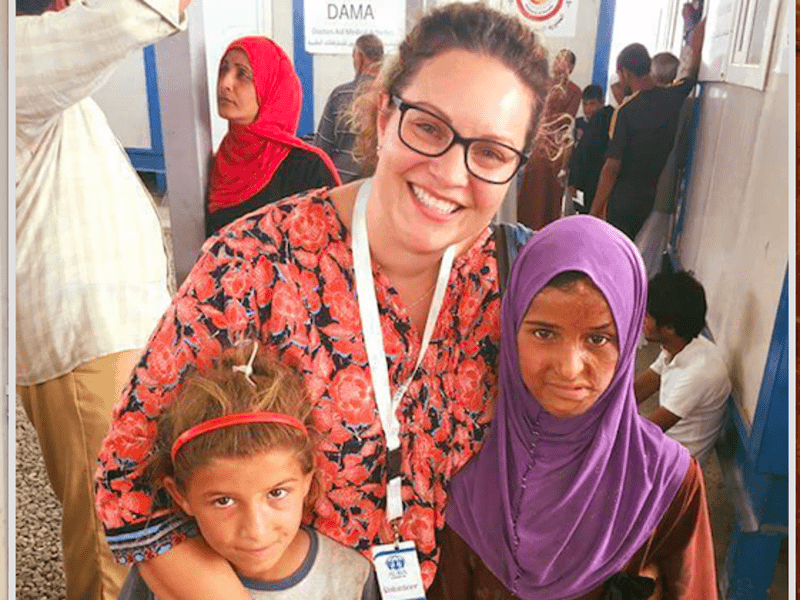
They are often the unsung heroes of the medical field, dedicating countless hours, mind, body and soul to the welfare of others, helping save lives, imparting reassuring words, holding the hand of those who have no one else. Under the instruction of doctors and at times on the receiving end of anger and frustration from their patients, nurses experience the full gamut of what life can offer, from new life to fighting for survival. Often described in the media as being underpaid, speak to any one of them and they will tell you they have a love for the job that sees them through all the negatives. Greek Australian Helen Zahos, is one great example. Born in Darwin and raised on Groote Eylandt in the Gulf of Carpentaria, she began her career as a nurse, and then emergency nurse in Darwin. She has been on hand to provide emergency assistance for victims of the Bali bombings, the refugees on Christmas Island and Lesvos and has recently returned from a stint in Iraq. Last year she also received the HACCI (Hellenic Australian Chambers of Commerce and Industry) Excellence Award for community service and was nominated for a Pride of Australia Medal.
GCT recently spoke with Helen about the realities of being a nurse in emergency situations, helping refugees and being acknowledged for her humanitarianism
Growing up on an Indigenous island in the Gulf of Carpentaria, the daughter of parents who came to Australia from the village of Ritini, near Katerini in Macedonia, Helen Zahos knew as a child she would one day do some sort of work, which would enable her to help people.
She spent the first 10 years of her career at Royal Darwin Hospital working both as a paramedic with St John Ambulance and then as an emergency nurse. She cites becoming the first graduate nurse to be in the emergency department, consequentially specialising in emergency, as a case of being in the right place at the right time. “I was a volunteer ambulance officer when they decided to start letting nurses come out into the emergency department on their post graduate rotation,” says Zahos. “It is the scenario of the elevator ride, I happened to be in an elevator in my ambulance uniform with a patient when the coordinator of the graduate nurses happened to be in there. We had a brief discussion and that was that.”

There was no turning back from that point. Her vast experience in the emergency department has proved crucial in some of the most devastating disasters in recent times, including natural disasters, the Bali bombings, war zones and treating influxes of refugees. “I assisted in both Bali bombings with receiving patients at the hospital in Darwin,” says Zahos. “I also assisted in the clean-up of the Katherine floods, the earthquake in Nepal and the typhoon in the Philippines. After Darwin I went out to the APY Lands (a large Aboriginal local government area located in the remote north west of South Australia) and worked in Indigenous communities. Having grown up on an Indigenous island I am very passionate about Indigenous health so I am fond of the time that I spent out in those communities. It was some of the toughest work that I have ever done, being a remote area nurse.”
According to Helen, the most important traits an emergency nurse needs to possess are courage, determination, and to have the ability to adapt and think quickly on your feet. “Also to have tolerance over situations that you have no control over and to be caring of those that are suffering,” she says. All traits which served her in good stead when working in Iraq recently.
“Iraq was a unique experience from the perspective of seeing the devastation of war first-hand and being able to sit and hear some of the stories of those that fled or had escaped,” says Zahos. “It was surreal hearing what people endured and how they continue to suffer. I was surprised at how safe I felt and how welcoming and hospitable the local people were. I will never forget the people I met and how I will cherish the rare moment a child would come up and hold my hand or give me a hug or share what they had. The endless invitations to come to a tent and be welcomed into their ‘home’ is something that still moves me.”
Helen has also been a helping hand in Greece and was on her way there for a holiday when the Greek financial crisis hit. Immensely concerned for her family after hearing stories about the pensioners, she contacted an NGO that ran a clinic in Thessaloniki, which provided medication and free doctor consultations for pensioners and the underprivileged who could not afford medical treatment. “I took a few weeks out of my holiday and volunteered there,” she says. “It was one way I felt I could contribute and help.” She also found herself in Lesvos at the height of the refugee crisis. “Thousands upon thousands of people were arriving and there was a mass exodus,” says Zahos. One of the most difficult times for Helen was being involved with the boat accident off Lesvos where 300 people were involved, 11 children and 27 adults drowned. “I spent the following days helping parents identify their deceased babies in the morgue. It was awful. It was a chaotic time overall, which now seems surreal, but it was one thing to watch it on the news and another to actually be there.”
“These refugees and asylum seekers are traumatised and have witnessed horrendous things that I could never even imagine. I think the most important thing to remember is that each of these people have a story, they have suffered unimaginably.”
Having worked on Christmas Island, Lesvos and Syria, Helen has had extensive experience with refugees, and has learned a couple of lessons along the way. “I have learned to not judge, I have learned to listen and to not assume and I have realised that these people have fled from their homes and left their lives as they knew them behind,” she says. “Many are educated and had prominent jobs and careers in the countries that they left behind. The journey that they chose to take was not an easy one and I can only imagine how frightening it would be to leave a place that you call home and to enter countries that you don’t know what you will find or how you will be received.”
Working in emergencies has exposed Helen to the best and worst in humanity. She has a myriad examples to share. The locals in Tacloban who were playing Christmas carols everywhere they went despite their town being completely destroyed by the typhoon right before Christmas. The university professor who was a refugee in Lesvos after fleeing Syria with his daughter, a gymnastics teacher, but helped one day when the interpreter was sick. His English was so good he helped the medical staff in the tent to translate while they treated patients all the while feeling embarrassed that he had not changed his socks in 2 weeks and had been walking for days with wet shoes. “I was able to give him a pair of socks and it was such a simple gesture but he was so appreciative,” says Zahos. The father carrying his 14 year old boy who had cerebral palsy. They did not have a wheelchair as the people traffickers had thrown it overboard and held a gun to the boy’s head and had said he goes without the wheelchair or he gets shot now. “This poor father was walking across the island with his son,” says Zahos. “The agency I was working with had run out of wheelchairs so I went and bought one from the pharmacy and was able to give them a wheelchair for the boy.”
“I think every trip has an experience that I will never forget,” she continues. “For Nepal we were on the mountain in the car travelling when the second big quake hit. We couldn’t continue on where we were going due to a landslide, so we ended up treating people on the side of the road and later stayed with the army at the barracks. But the aftershocks were frequent and scary.”
There is, however, the constant reminder that danger is a viable possibility. During the December 2015 riots at Idomeni, Helen was mistaken for a police officer as she was treating a patient. “I got hit in the face with a metal bar and they thought I had a broken jaw and I was concussed,” she says.

In 2016 Helen received a HACCI Excellence Award and was nominated for a Pride of Australia Medal in recognition of her service and humanitarianism. “When you are involved with meaningful work such as helping people, and volunteering you really do it from the heart, you don’t expect a thankyou or any recognition for what you have done,” she says. “I was asked recently about what I thought the definition of ‘filotimo’ is and for me it is helping another human without discrimination and without expecting anything in return. I was surprised at the nominations and receiving the HACCI award for community service. It was an honour to be recognised by the Hellenes of Australia for the work that I have done both locally and internationally.”
“There is something satisfying about giving a thirsty person water to drink, or a hungry person some food to eat. The experience made me realise how lucky we are to be in Australia and how by sheer luck and chance I was born into the life I have and am so privileged compared to these people, I have been given opportunities and choices that these children will never have.”
It is easy to assume that emergency nurses get little or no time to unwind, and yet, it is necessary, particularly following a harrowing experience such as treating injured children in a war zone. “Depending on the location, during a disaster or in a conflict zone it is very difficult to have your own space,” says Zahos. “This is where the camaraderie of being with other team members helps. If there is electricity I listen to music. Spending time with friends and family when I return and spending time in my garden is also good, but yes, you could say I find it difficult to unwind!”
These are the quiet times when Helen’s mind travels home to her family. “What I miss most in these times is my mum’s cooking and Greek food! Especially if it is over the Christmas holidays or when I know there is a family gathering and I’m away,” she says. “In some disasters just having a basic shower or washing my hair is what I missed the most.”
In the face of dangerous locations, treacherous conditions, long hours, and the emotional toll of meeting people in such desperate need, Helen is in no rush to rest just yet. “I am looking for more permanent work but if I am still doing contract work I may revisit Iraq,” she says. “I have no plans as yet to take off but those trips usually happen pretty suddenly and spur of the moment, who knows what the next year will bring.”


